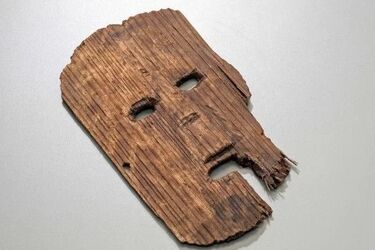Perfectly preserved wooden mask of the early third century found by archaeologists in Japan: what it looks like

A wooden mask dating back to 1800 years has been found in Japan, which was probably used at agricultural festivals. The discovery dates back to the beginning of the third century. It was discovered among the ruins of Nishi-Iwata in Osaka Prefecture, Japan.
The discovery was announced by the Osaka Cultural Heritage Center. According to the local edition of TBS NEWS, experts believe that the artifact was important in influential agricultural festivals organized by influential people of the time.
Read also: As if made of glass: a new species of orchids found in Japan (photo)
The wooden mask, carved from cedar wood, measures about 30 cm in height and 18 cm in width. It has two eye holes, a mouth hole, and a perforated hole that probably held a rope to secure the mask to the face.
"The mask was found in sedimentary deposits at a depth of 2.9 meters from the ground surface. It was found next to a fragment of a wooden water bucket and a burnt wooden object in the shape of a hoe. Experts believe that these three objects could well have been presented at agricultural festivals," the report says.

Scholars have suggested that the mask may have been used in ceremonial rituals during significant agricultural festivals around 1800 years ago, during the Yayoi period. During this time, Japan transitioned to a settled agricultural society, using farming methods introduced from Korea to the Kyushu region.
Makimukugaku, the director of the research center, said that the mask was probably displayed at festivals because it was too heavy to wear.
"I believe that the mask represented the 'spirit of the head,' which was believed to be a god in human form and represented the authority of the Okimi," he said.
Okimi is the title of the ruler of the Yamato Kingdom, a political alliance of powerful families centered in modern-day Nara Prefecture that ruled from the third to the seventh century.
Read also about how the "copper" remains of a small child with a coin in his hand were found in an abandoned cemetery in Nyarlorinczi, Hungary.
If you want to get the latest news about the war and events in Ukraine, subscribe to our Telegram channel!
